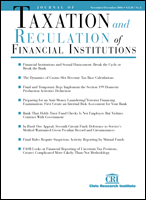The Historic Tax Credit—Issues for Lenders, Developers, and Investors
Author: Penny S. Indictor.
Source: Volume 26, Number 04, March/April 2013 , pp.17-28(12)

< previous article |next article > |return to table of contents
Abstract:
The Historic Tax Credit (HTC) can help finance historic rehabilitation in connection with commercial, residential rental, and mixed-use real estate developments. This article describes the basic principles and calculation of the HTC and the transaction structures that use the HTC to generate investor equity as a source of financing for historic rehabilitation projects. The HTC may be combined with Low-Income Housing Tax Credits, New Markets Tax Credits and/or Facade Easements, as well as with tax credits made available under state HTC programs, all of which add complexity to the transaction structure. Adding to the complexity, various aspects of HTC transaction structures require close scrutiny in light of the recent decision of the Third Circuit Court of Appeals in Historic Boardwalk Hall, which disallowed the allocation of HTC to an equity investor, holding that such investor was not a bona fide partner in the HTC entity. Regardless of the specific structuring details of a particular HTC transaction, the lender involved should focus on the steps necessary to obtain adequate security for its loan—a few extra steps may be required and the security may be in a somewhat different form than what might be expected in a more traditional lending context.Keywords: IRC Sec. 47, qualified rehabilitation expense, substantial rehabilitation test, historic tax credit recapture, lease pass-through structure, Historic Boardwalk Hall
Affiliations:
1: Berman, Indictor & Poppel LLP.